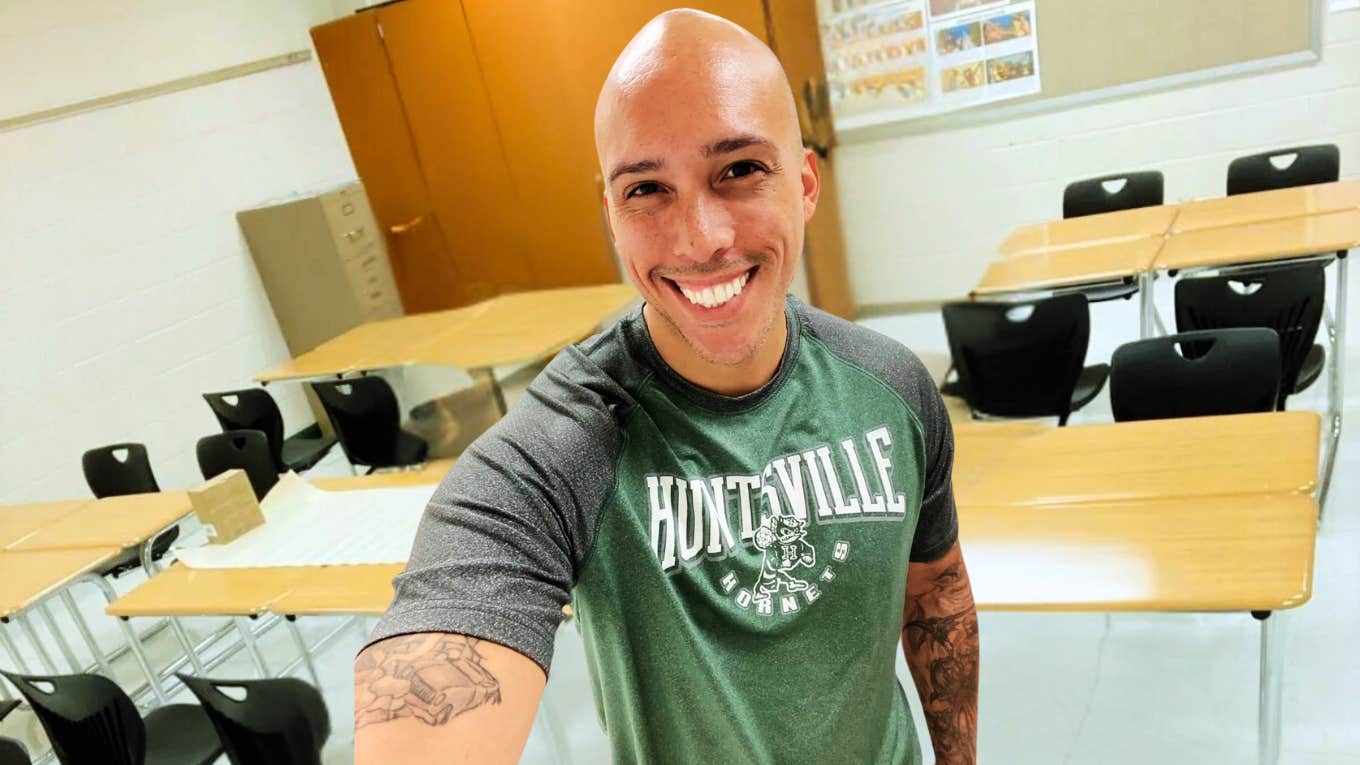I Left My Students In The Middle Of The Day Because I Couldn't Handle Teaching Anymore — 'I Felt Like A Failure'
I came into public education with dreams. I left my first year exhausted.
 Courtesy Of Author
Courtesy Of Author The halls were quiet when I stepped into Huntsville High School. The lockers were closed, the floors were polished, and the walls were bare of student work or announcement flyers. My first day as an 11th-grade English teacher was a week away.
I was petrified. It wasn’t the students who scared me, nor was it the idea of building lessons or teaching novels that might put whole classes to sleep. I was scared about how much I cared.
Like most first-year teachers, I came into education with dreams of dazzling my students, like Robin Williams in Dead Poets Society.
I wanted to transform kids’ lives with my wit and wisdom, introducing them to obscure texts to awaken a potential they never saw in themselves. That fantasy died a quick death. Within my first two weeks of teaching, one of my students was killed in a drive-by shooting. Another was diagnosed with brain cancer. But I wasn’t deterred.
I approached teaching like any other job — full of energy, enthusiasm, and a yearning to prove myself. I worked late everyday grading papers, prepped weekly lessons on Sundays, and called parents daily about student progress. It took me just eight weeks to hit a wall.
Research studies referenced by a study published by the Journal of Teaching and Teacher Education investigated North American school districts and have established that approximately 40–50% of teachers exit the profession within their first five years.
First-year teachers often experience challenges such as feeling overwhelmed, ineffective, and unsupported. They may also struggle with classroom management, communication with parents and administration, and preparing for their first teaching assignment.
Around this time, I was assigned a mentor, Kelly Jordan. Kelly had been head of the English department for eighteen years, and she protected her people with a fierceness I admired. I mentioned to her that I wasn’t getting much sleep.
 Rido | Shutterstock
Rido | Shutterstock
Kelly said I had developed what she called “teacher brain.” It’s when your mind won’t shut down because of all the plates a teacher has to keep spinning at once.
I tried meditating, exercising, and taking medications. Nothing helped. I still couldn’t sleep. Add the fact that my wife was pregnant, and we had just moved to a new state with no friends or family around. It was no surprise I was starting to burn out. And it was only October! How was I going to make it to May?
One 2018 study also linked “experienced failure at work, emotional dissonance and social exclusion” to teachers’ reduced sleep quality. A 2022 overview reported that between 36 to 61 percent of teachers reported insomnia symptoms.
Blessedly, a veteran administrator, Ms. Dawson, gave me some great advice during the school's monthly new-teacher meetings. “Your only goal in your first year is to survive,” she told me.
God, what a relief. I needed to hear that letting some of those plates drop was okay. I was coming to realize that there was more to teaching than I had thought. Not only did I have to perfect classroom management skills that kept students productive and on-task, but I had to learn how to teach different students with different learning styles.
I also realized that being a teacher, especially a male teacher, wasn’t just about teaching — it was about bonding. It was about building relationships with foreign exchange students from as far away as Senegal. It was about discussing the themes of greed in The Great Gatsby while young men confided in me about their dads serving jail time for armed robbery.
I felt an obligation to show up every day, clean-cut and well-dressed, and show my students what it meant to be a responsible adult, no matter how tired I was. By February, exhausted from lack of sleep, I hit another wall. Hard.
 Elnur | Shutterstock
Elnur | Shutterstock
At some point, while worrying over my wife’s preeclampsia and struggling to get my students interested in their schoolwork, I realized I’d stopped caring about teaching.
Though I still mapped out lessons and sought the right balance between classroom management and teaching methods, I had checked out. I realized that I had taken the advice that all I had to do was survive too far. I’m ashamed to say I doled out grades without reading student work. I cared more about activities that kept my students busy than teaching them. Guilt and Teacher Brain worked hand-in-hand to keep me awake and stressed.
I was reaching my breaking point. Then, I had my worst day as a first-year teacher. Like any public school, student fights were common at Huntsville High School. One afternoon, a fight broke out between two female students, and no one of authority was around but me and another administrator.
Without thinking, we pushed through the crowd of students watching the fight and pulled the girls apart. While they threw haymakers and wild kicks, the administrator guided me on properly restraining one of the girls.
It wasn’t easy. The girls were strong and angry, and I was on the ground when I finally got a firm hold on my student’s arms. Still, no one had arrived to help. When I looked up, I found half a dozen boys surrounding me with wild looks in their eyes. Two of them were shaking with rage.
The girl I was restraining was their cousin. I was afraid I was about to be jumped. Fortunately, the school safety officers arrived with more administrators. The girls were taken away, and the group dispersed. But I couldn’t breathe. Shaking, I rushed into an empty break room and did breathing exercises. It wasn’t working.
I was having a panic attack. I went home. Defeated. Dejected.
I left my students in the middle of the day because I couldn’t keep my sh-t together. I felt like a failure.
I had forgotten something crucial. My mentor, Kelly, checked in on me that night. Because I had approached teaching like my other jobs, I had thought, like prior supervisors, she’d be upset that I had left mid-day. Instead, she told me she was furious with the school for leaving me to de-escalate the fight with only on-the-spot training as guidance. I was so happy. I never had this kind of backup from a supervisor.
She ended our conversation with, “Remember, we’re here for you.”
I closed my eyes and smiled. I finally realized my mistake. Since my first day of teaching, I had never taken advantage of the help available to me. I thought I had to carry the burdens of teaching alone.
I forgot about people like my fellow English teachers, who knew what I was going through, yet I never reached out to them. I forgot about Kelly. Though we spoke regularly throughout the year, I never confided in her about how heavy a burden teaching felt. And though I met with Ms. Dawson once a month, I never admitted I was afraid.
Because I refused to see the available help, I had turned myself into a lone wolf. I finally realized that education isn’t just about the curriculum. It’s also about the people.
From then on, teaching got a bit easier. I finished my first school year understanding that public education is an impossible job, but it gets easier when you’re willing to ask for help.
And when you’re willing to help your coworkers. In that, teaching is no different from any other job. I’m going on four years as a public school educator. It’s a complicated job, but I’ve loved almost every minute.
 New Africa | Shutterstock
New Africa | Shutterstock
If I can impart wisdom to first-year teachers — or even some experienced teachers — it’s to learn the art of “no.”
A lot of beginner teachers want to please. They’ll say yes to almost anything, running after-school clubs, teaching on the weekends, or heading up committees that steal your free time — especially if it’s the students asking. I learned quickly that a “yes” opens a door many first-year teachers cannot close.
Be honest. Say no. You’re already spinning enough plates. That being said, workplace challenges are surmountable if you have a good group of coworkers and are lucky enough to have a great mentor to walk you through the pitfalls of the first stages of a new career.
Support is how we thrive. Don’t let the demands of your workplace overwhelm you like they almost did me.
Michael Maceira is a writer and English teacher with a fast-growing audience on Medium. His work has been featured in The Narrative Arc, Psychology of Workplaces, and Fictions, where he shares fiction short stories and personal essays. He’s also a husband, father, chess player, and voracious reader.
